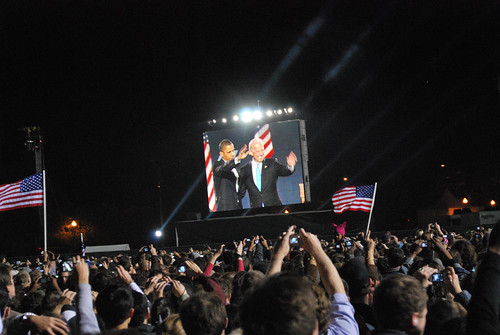
{Photo by rocketlass.}
I'm deep into War and Peace now, making a concerted press to get through the last twenty percent--but I took a break tonight to turn to some of my favorite writings on Tolstoy, and I found a couple of pieces well worth sharing as a follow-up to last week's post on General Kutuzov.
First, from Isaiah Berlin's The Hedgehog and the Fox: An Essay on Tolstoy's View of History (1953), an account of his role and his evolution as a character through Tolstoy's innumerable drafts:
Such heroes as Pierre Bezukhov or Karataev are at least imaginary, and Tolstoy had an undisputed right to endow them with all the attributes he admired--humility, freedom from bureaucratic or scientific or other rationalistic kinds of blindness. But Kutuzov was a real person, and it is all the more instructive to observe the steps by which he transforms him from the sly, elderly, feeble, voluptuary, the corrupt and somewhat sycophantic courtier of the early drafts of War and Peace, which were based on authentic sources, into the unforgettable symbol of the Russian people in all its simplicity and intuitive wisdom. By the time we reach the celebrated passage--one of the most moving in literature--in which Tolstoy describes the moment when the old man is woken in his camp at Fili to be told that the French army is retreating, we have left the facts behind us, and are in an imaginary realm, a historical and emotional atmosphere for which the evidence is flimsy, but which is artistically indispensable to Tolstoy's design. The final apotheosis of Kutuzov is totally unhistorical, for all Tolstoy's repeated professions of his undeviating devotion to the sacred cause of truth.Which leads nicely into this complementary passage on Tolstoy's method of revision, from Viktor Shklovsky's Energy of Delusion: A Book on Plot (1981), a collection of oblique, pithy, idiosyncratic, piercingly acute observations that should always be close at hand for anyone who is reading Tolstoy:
In War and Peace Tolstoy treats facts cavalierly when it suits him, because he is above all obsessed by his thesis--the contrast between the universal and all-important but delusive experience of free will, the feeling of responsibility, the values of private life generally, on the one hand; and on the other the reality of inexorable historical determinism, not, indeed, experienced directly, but known to be true on irrefutable theoretical grounds.
I'll repeat what's important for me: Lev Nikolaevich Tolstoy said that he didn't know how to draw a circle; he had to close the line and then correct it.Tolstoy's drafts are like parallel universes whose tiny initial differences lead to wildly different outcomes; I like to imagine a different, parallel Tolstoy in each of those universes who was satisfied with, and published, each of those variations. For decades after Kutuzov's death, we lived in a universe in which he was a sycophantic voluptuary--until Tolstoy, to suit his vision, shifted us into a different, one where Kutuzov's resignation in the face of fate was the mark of a hero.
He knew how to think by juxtaposing words, by awakening them, in a way.
When he wrote his major novels, he would begin with something plotted, i.e., something that was happening or had already happened, and sought the relationship between the incidental and the inevitable.
He studied the thoughts of a child and how cunning emerged at its first stages.
The so-called draft version is not an adaptation of a text to the norms, not sorting through gems, like jewelers do when making necklaces and crowns.
Drafts weigh the essence of events. The scenarios, which the hero of the work goes through, they should be called "hypothetical circumstances."
This is the analysis of how man was created, i.e. his sensation of the world, and how through the movements of scenarios, experimented and tested hundreds of times in fiction, the truth becomes clearer.
This work is like that of a captain who navigates by the stars and moon, using his chronometer to verify and make sure of their hypothetical place in the sky. The captain is testing the ship's course.
The book I'm writing is still moving in front of me, swaying on the waves. I'm cutting away at my subject with words--the way a stonecutter or sculptor works. I'm searching for meaning.
The purpose of my search is art.
The world moved in front of Tolstoy. He was near-sighted and never wore glasses, so as not to introduce yet another convention into his vision. His books move; they show mankind's way of thinking in those times.
